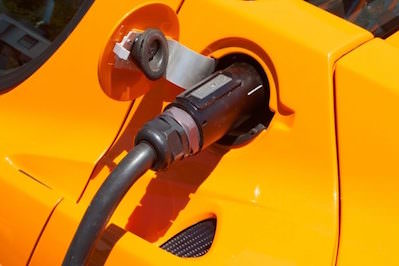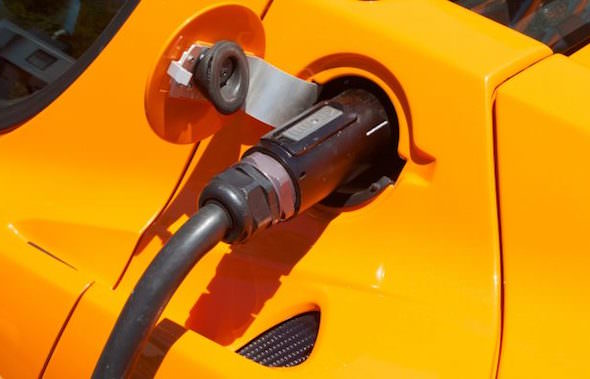Investors Tell Auto Industry to Move to Low Carbon—or Else
Car manufacturers are warned that they must address climate change by switching to low-emission models—or face a sell-off of their shares.
By Terry Macalister / Climate News Network

The traditional car industry has gradually been increasing its output of pure electric and hybrid diesel/electric models, but in small numbers. (Windell Oskay via Flickr)
LONDON — Major investors have warned the automotive industry it needs to accelerate its readiness for a low-carbon world if it is to retain their support and prosper.
Vehicle makers must put climate change specialists on their boards, engage better with policy-makers, and invest more heavily in low-emission cars, says a network of 250 global investors with assets of more than $24trillion.
The demands come in a new report, Investor Expectations of Automotive Companies, published this week by the Institutional Investors Group on Climate Change (IIGCC).
“Long-term investors want to ensure that automotive companies are prepared for the challenges stemming from climate change, new technologies, changing policies and shifts in demand caused by global trends,” says Dr Hans-Christoph Hirt, co-head of investment house Hermes EOS, a member of the IGCC.
“Investors expect the industry to embark upon a smoother route to future prosperity by developing and implementing long-term business strategies that are resilient to climate change and resulting regulatory shifts.”
Sustainable returns
Chris Davis, senior programme director of the Ceres Investor Network on Climate Risk, another IIGCC member, agrees. “A growing number of institutional investors recognise that climate change will impact their holdings, portfolios, and asset values in the short and long-term,” he says.
“To achieve sustainable returns for clients and beneficiaries, investors in the automotive sector must engage to ensure companies are prepared to thrive in a carbon-constrained environment and support robust policy action sufficient to drive the transition to clean vehicles.”
The traditional car industry has gradually been increasing its output of pure electric and hybrid diesel/electric models, but in small numbers. It has failed to shrug off its image as a foot-dragger in the fight against climate change — similar to the way most big oil companies are seen.
“Investors in the automotive sector must engage
to ensure companies are prepared to thrive in
a carbon-constrained environment.”
The recent Volkswagen emissions scandal, in which the German car manufacturer used “cheat devices” that underplayed pollution on its cars, has further tarnished the industry’s image over the last 12 months. And critics have long claimed that few vehicles live up to the fuel consumption levels claimed of them.
Making sure the industry has “closed the gap between real world and emissions testing” is highlighted by the IIGCC as one of the key issue that must be fixed.
But the finance houses also want car and truck makers to set more meaningful targets and metrics to reduce greenhouse gases in their own supply chain. And car companies need to engage more meaningfully with international policy-makers and their own investors on climate change.
Big investors point out that large car companies face serious threats inside their own sector from innovators such as the California-based automaker Tesla, evangelists for climate change and producers of low-carbon electric vehicles.
Climate agreement
And the finance houses say the move towards driverless vehicles, being pioneered by the likes of Google, poses a threat of even more severe potential new competition for the traditional car firms.
Last year’s Paris climate change agreement has increased the urgency for the big manufacturers such as Ford, VW and Toyota to move more quickly, the report warns.
They point to a recent study by the Moody’s credit agency that highlighted the potential dangers of tighter regulations for vehicles.
And the new IIGCC report warns that the automotive industry is already exposed to “a plethora of CO2 and pollutant emission reduction targets in all major markets”.
It says that tougher vehicle standards have already been implemented or are on their way in Australia, Brazil, China and India, as well as the US and Europe.
And it stresses that governments are increasingly incentivising the use of electric vehicles in countries such as Norway and Holland.
Terry Macalister, an award-winning journalist and author of a book on the Arctic, is former energy editor of The Guardian newspaper.
Your support matters…Independent journalism is under threat and overshadowed by heavily funded mainstream media.
You can help level the playing field. Become a member.
Your tax-deductible contribution keeps us digging beneath the headlines to give you thought-provoking, investigative reporting and analysis that unearths what's really happening- without compromise.
Give today to support our courageous, independent journalists.








You need to be a supporter to comment.
There are currently no responses to this article.
Be the first to respond.